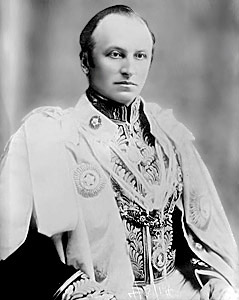
After many months of absence, and many happenings on which I hold an opinion and failed to write (e.g. tuition fees, Wikileaks), I came across this long-running issue, or rather these two inter-connected issues. Since the introduction of salaries for MPs in 1911, there has been the question of whether politics should be treated as any other professional employment, or whether it is wrong to treat the highest level of public service as a career. Loosely connected to this is the idea of statesmanship - the idea of those holding public office conducting themselves with a sense of mission and responsibility. Many argue that we should root out careerist politicians so as to promote a statesman-like approach to governance. But can we separate the three - careerists, politicians, statesmen - or do they necessarily appear together in a political system such as ours?
Many people assume that any student reading politics and international relations, like myself, necessarily wants to become an MP, and are sometimes surprised when told otherwise. Yet despite this assumption, many see 'professional politicians' as a Bad Thing, as one of many factors that make politics uninteresting, and politicians unrepresentative or detached from 'real' people. But is there not something strange about this attitude? As one of my close friends challenges, why should we treat someone who wants to spend their life working in politics (such as himself) as any different to one who wished to work in finance? The argument is, of course, that democratic politics is not the same as finance or any other career. It is argued that denouncing the professionalism of politicians is justified because it is good for the country and its citizens if those in charge have some experience of how their decisions will affect others. Yet arguably people working high up in non-governmental positions, especially finance, have an equally narrow experience of the wider world. In addition, they tend to be more self-serving, so encouraging a stint in non-political employment for potential politicians does not equal better or more experienced rulers.
But where do we draw the line between professional politician and careerist? It is surely harmful for the country to be ruled by a group of politicians who are concerned chiefly with self-advancement. Holding the reins of public office or working in government service, in whatever department, is a huge responsibility. It is not the same as any other profession, as no other profession can have such an impact on the everyday lives of all citizens, nor indeed receive so much unpopularity for trying to achieve compromise. In other professions, careerism is problematic as individuals focus on their promotion rather than the collective or long-term good. In democratic politics, however, the problem can be seen to be deeper than promotion, as the ultimate aim is to win elections. Clearly elections are necessary, but they have the tendency to promote careerism within the field of politics, as each reform a government may see as necessary comes under scrutiny as to how it would play out at elections.
All this would suggest we need to promote the ideal of 'statesmanship'. Harry Truman referred to a statesman as "a politician who has been dead for 15 years", but that need not be the case. Perhaps a better distinction is that, as Mikhail Gorbachev said, "a statesman does what he believes is best for his country, a politician does what best gets him re-elected". In a political system such as ours, with its previously mentioned emphasis on elections, true statesmen tend to be few and far between. The picture at the top of this article is of Lord Curzon as Viceroy of India (he served from 1898-1905), someone who was recognised at the time of his Viceroyalty as acting in the interests of the people of India and also of the Empire. But Curzon is at the same time a prime example of how our system discourages statesman-like behaviour. After his return from India he was cast out into the wilderness, and although he entered the Cabinet in 1915 and served as a successful Foreign Secretary from 1919-24, he was never able to attain the premiership. Personal faults aside, he was simply out-manoeuvred by politicians such as Stanley Baldwin and David Lloyd George, and attacked by careerists such as Kitchener. Statesmen, it would seem, find it hard to climb the greasy pole of politics.
So in recognition of all this, should we give up on the seemingly unattainable ideal of the statesman in favour of Machiavelli's Prince? Not wholly - what is needed is a more realistic view. The world of politics is not cleanly divided into separate categories - one need only look at Winston Churchill for proof. He entered politics as a way to further his career, before being recognised as a consummate politician after his defection to the Liberal Party and then back to the Conservatives. His war record speaks for itself, and he was awarded a knighthood and a state funeral in recognition of his service as a statesman. There are a few who attain statesmanship early in their career, but on the whole it appears to be a badge associated with longevity and experience. Therefore we should recognise that we need professional politicians in order to breed statesmen - that in contrast to the popular view, working in politics for one's entire life is beneficial for the people and the country, even if it is a thankless task.

 In the dying days of the Ottoman Empire, the 'Eastern Question' was a hot topic among Western powers. Now, over the last 18 months or so, Turkey has again been garnering a lot of international attention, beginning with Prime Minister Erdogan (pictured, with David Cameron) walking out of the Davos forum last year in protest at Israel's Gaza operations, through to voting against sanctions on Iran in a recent UN Security Council meeting. Actions such as these, together with increasingly close ties with Russia and China, have led to the perception that Turkey is 'looking eastwards' after decades (or indeed centuries) of Westernisation. For many this appears to be a cause for concern, a symbol of the decline of Western economies and a country turning away from those that were previously its allies (most obviously Israel). There also appears to be a perception prevalent in the media that Turkey's government is turning the country away from liberal values and instead paving the way to Islamisation (One of the more extreme articles can be seen at
In the dying days of the Ottoman Empire, the 'Eastern Question' was a hot topic among Western powers. Now, over the last 18 months or so, Turkey has again been garnering a lot of international attention, beginning with Prime Minister Erdogan (pictured, with David Cameron) walking out of the Davos forum last year in protest at Israel's Gaza operations, through to voting against sanctions on Iran in a recent UN Security Council meeting. Actions such as these, together with increasingly close ties with Russia and China, have led to the perception that Turkey is 'looking eastwards' after decades (or indeed centuries) of Westernisation. For many this appears to be a cause for concern, a symbol of the decline of Western economies and a country turning away from those that were previously its allies (most obviously Israel). There also appears to be a perception prevalent in the media that Turkey's government is turning the country away from liberal values and instead paving the way to Islamisation (One of the more extreme articles can be seen at